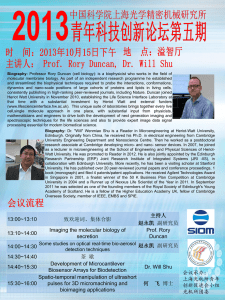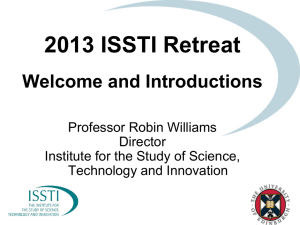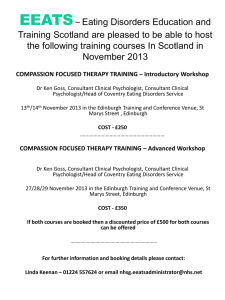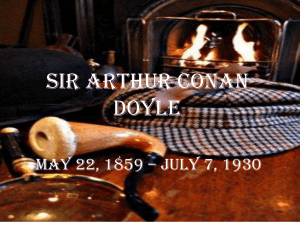Delivering the Youth Work Programme
advertisement
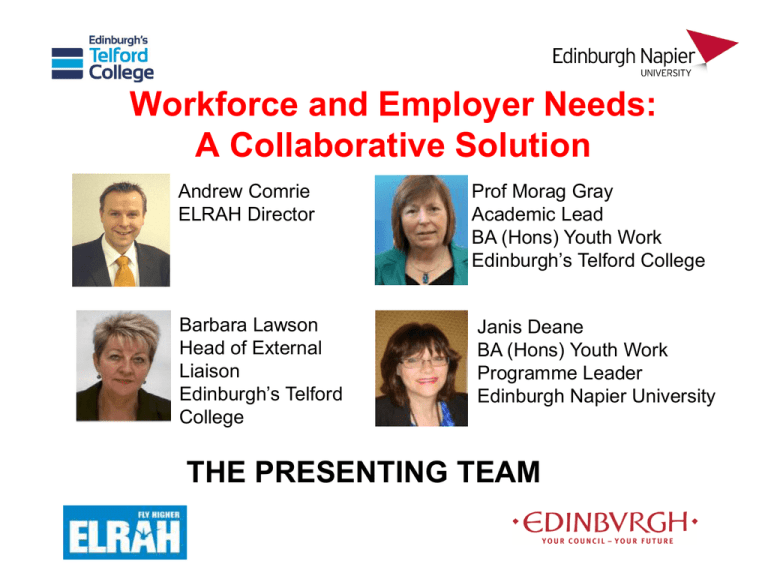
Workforce and Employer Needs: A Collaborative Solution Andrew Comrie ELRAH Director Prof Morag Gray Academic Lead BA (Hons) Youth Work Edinburgh’s Telford College Barbara Lawson Head of External Liaison Edinburgh’s Telford College Janis Deane BA (Hons) Youth Work Programme Leader Edinburgh Napier University THE PRESENTING TEAM Part 1: Introduction ELRAH Director Presentation Structure • Introduction • Background to the Youth Work Programme • Designing the Youth Work Programme • Delivering the Youth Work Programme • Sum Up Delegate Questions A Changing Post-16 Education Landscape September 2010 - Scottish Government published their prelegislative White Paper, “ Putting Learners at the Centre: Delivering our Ambitions for Post-16 Education in Scotland” http://www.scotland.gov.uk/Publications/2011/09/15103949/0 • Focus on workforce skills development. • Regional Planning (driven by regional labour market needs). • Collaborative curriculum design and delivery (HEI, Colleges and Employers working more closely in partnership to design and deliver programmes). • No loss of time for learners (especially those moving to degree study having studied HE level programmes in a Scottish College). • New “partnership models” for delivering HE in Scotland. Helping with the Challenge of Designing Work-based Programmes • JISC Work-Based Learning Maturity Toolkit: http://www.tinyurl.com/wbl-toolkit used to inform and evaluate the design and delivery of the Youth Work Programme. • Partnership development funded by JISC, led by University of Bradford in collaboration with University of Westminster, University of Wales Institute Cardiff and Middlesex University and ELRAH. Poll Question 1 The term ARTICULATION has become commonplace in colleges and HEIs in Scotland. What does it mean? College Students can gain some credit when applying for undergraduate programmes for prior learning at HE levels in colleges. College Students gain full credit for Higher National Qualifications gained in colleges entering level 2 with an HNC and Level 3 with an HND. HEIs reserve places. College Students must be able to evidence advanced level academic skills before being offered an undergraduate place in an HEI. Don’t Know Part 2: Background to the Youth Work Programme Barbara Lawson Head of External Liaison Edinburgh’s Telford College Background Youth Work Programme • New Youth Work Programme developed to illustrate an alternative, collaborative way of delivering HE which is more flexible and responsive to local employer need. • Articulation is designed in – students can enter at advanced levels of the programme depending on prior qualifications and experience - this was a key aspect for the employer. Successful Partnership Working Edinburgh City Council Edinburgh’s Telford College ELRAH Our Successful Partnership Edinburgh Napier University Skills for Scotland Scottish Qualifications Credit Framework PUBLIC SECTOR EMPLOYER ENGAGEMENT Gavin Crosby Youth Work Strategy Implementation Manager Christine Mackay Sue Bruce CLD Manager CEO Edinburgh Council Youth Work Degree Sue Bruce – Chief Executive, City of Edinburgh Council “By working in partnership we have made best use of our resources and produced a very cost effective course, grounded in practice and accessible to a group of staff who now have the opportunity to access this excellent professional training.” Sue Bruce – Chief Executive, City of Edinburgh Council Christine Mackay – Edinburgh City Council Community Learning and Development (CLD) Manager “The development of the work-based Youth Work Degree has been an important development for us. Working with Edinburgh Napier University and Edinburgh’s Telford has been a very positive experience – our secondment of an experienced youth worker to the qualification design team has ensured that the content reflects the needs of the field and core competencies which was invaluable for us and great professional development for her. Developing this qualification has helped us ensure we train work-based assessors who will be evidencing those competences and this has been really worthwhile” Christine Mackay – Edinburgh City Council Community Learning and Development (CLD) Manager Gavin Crosby – Edinburgh City Council Youth Work Strategy Implementation Manager http://www.youtube.com/watch?v=OfsdSMxzo1s Question time Part 3: Designing the Youth Work Programme Prof. Morag Gray Academic Lead, BA Youth Work Edinburgh’s Telford College Collaborative Development of Programme Design Sept 2010 • Learning gap expressed by Edinburgh City Council • ELRAH Scoping • Partnership working and early agreement Plan • Detailed Planning document • Planning Team: Experienced curriculum developer & seconded subject expert • Regular progress meetings Build • Programme Team • Existing Approved Foundation Degree Framework • CLD competencies & National Occupational Standards for Youth Work Test • Employer Expert Team • Potential Students • Module Content • Stage alignment and integrity • Delivery and assessment strategies Validation • Collaborative programme Documentation • Cohesive team reflecting partnership ‘defended’ programme • Commended by validation panel for obvious close working relationships May 2011 Start September 2011 Programme Structure 1 Year 9 months 1 year 3 months 1 year 3 months 6 months Stage 4 Stage 3 Stage 2 Stage 1 This course is perfect for me otherwise I would have to leave my job. What would I do if I failed the course? I would have no job. Question time Part 4: Delivering the Youth Work Programme Janis Deane Programme Leader Edinburgh Napier University Delivering the Youth Work Programme • Community of practice and peer support • Blended learning and the constructivist delivery model • E-learning and the 3 major components of the online environment: activities, resources and supports (Oliver & Herrington 2001) Delivering the Youth Work Programme: Pre-entry and induction Delivering the Youth Work Programme: Blended and online learning Delivering the Youth Work Programme: Student voice http://www.youtube.com/watch?v=314c13vocZE Delivering the Youth Work Programme: E-learning Moule’s E-learning ladder (page 41 at the link below) offered a conceptual model for planning e-learning approaches across the programme. Moule, P. (2007) Challenging the 5 stage model for e- learning: a new approach ALT-J Research in Learning Technology 15 (1) pp37-50 [internet] available at http://repository.alt.ac.uk/713/1/ALT_JVol15_No1_2007_Challenging_the_five-stage_mod.pdf Delivering the Youth Work Programme: Example of online learning activity Discussion posting 2 – Critical Incident Analysis # Look back at the Unit 1 week 2 reflection material and the reflective models reading in particular. # Using a model of reflection of your choice, undertake a critical incident analysis of a situation or event at work or in your personal life. This can be a small but significant event and need not be a crisis or even negative. Be careful with confidential information e.g. clients’ or colleague’s names! # Write this up as a 300 word (maximum) discussion posting and make at least 2 responses to other students of 50 words total. This is worth10% of the module mark and due in week 7. Delivering the Youth Work Programme; brief extract from online discussion posting • Subject: Discussion Posting 2 - Critical Incident Analysis Topic: Online Discussion 2 Deadline 12 Noon 21.10.11 Author: xxxxxxx Date: 20 October 2011 12:02 PM On researching different models of reflection, I have decided to complete a critical incident analysis using The Reflective Cycle (Gibbs G, 1988, Learning By Doing). I deliver a substance awareness session to a capacity building group as part of their twelve week programme, a few groups ago they asked if we would be interested in allowing a young person to complete their work placement in ---------------. We decided to have her placement as part of my project and that I would supervise her. Delivering the Youth Work Programme: Grading criteria for on-line discussions Description and points out of 10 0 • No posts, non-participation by student or merely repeats other people’s contributions or not addressing the topic/question. 1-3 • Participates in a limited way, with relevant material but which has limited analysis or engagement of fellow-students. Posts but does not respond to peers or uses social/informal style with slang/text language. 4-7 • Participates with relevant contributions showing critical thought based on literature use. Trying to engage with fellow-students but could be stronger. 8-10 • Consistently enthusiastic and rigorous participation by student. Responsive engagement with material and with fellow-students. Evidence of critical thought based on a literature use to demonstrate new insights or synthesis of innovative ideas. Marker’s comments 10/10 Excellent posting in both content and style and use of the Gibbs reflective cycle to add structure. 6 positive responses to others. Obvious learning with forward planning. Any further questions, please get back to me. Janis Question time Summing Up • An Effective, Collaborative Partnership – employer actively involved from the start inputting to the design as well as development and delivery. • A Work-based undergraduate programme developed and validated in 8 months. • A flexible programme – designed to meet industry needs with multiple entry and exit points • Learners able to accelerate learning by getting maximum credit for prior qualifications (including work-based qualifications) and prior experience. • Technology enabled to support remote learning, peer learning and mixed model of learner support from both College, HEI and Employers ONLINE DISCUSSION • Please join us now in the online discussion area where we will be delighted to answer any further questions you may have. • As a starter for ten: Are you experiencing similar changes to post-16 education where you come from? What will this mean for future delivery models of your programmes? Contact for Further Information Andrew Comrie a.comrie@napier.ac.uk ELRAH Website: www.elrah.ac.uk
